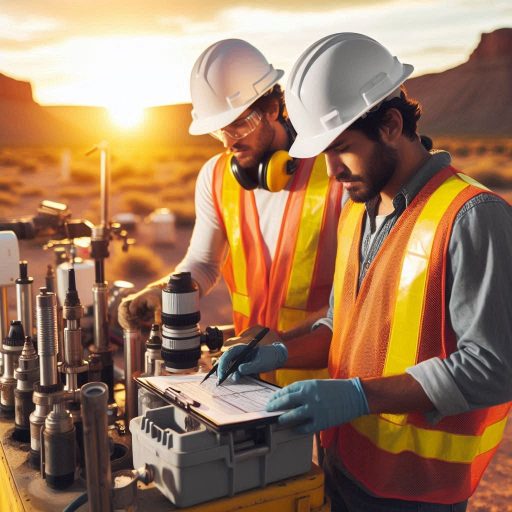Introduction
Petroleum technology focuses on the exploration, extraction, and production of oil and gas resources.
This field encompasses a wide range of technical and scientific disciplines aimed at efficiently and safely harnessing energy resources from the earth.
Specialization within petroleum technology is crucial due to the complexity and diversity of tasks involved in the industry.
Specializations help address specific challenges and optimize processes in various stages of petroleum production.
Each area of specialization brings targeted expertise and solutions, ensuring that operations are efficient, safe, and environmentally responsible.
By focusing on distinct aspects of petroleum technology, professionals can contribute more effectively to the industry‘s goals.
Several key specializations exist within petroleum technology.
Reservoir Engineering involves analyzing and managing oil and gas reservoirs to maximize production.
Drilling Engineering focuses on designing and executing drilling plans to safely access hydrocarbon deposits.
Production Engineering deals with optimizing the extraction and processing of oil and gas.
Petroleum Geology combines geological expertise with exploration techniques to identify potential drilling sites.
Petroleum Engineering broadly covers the application of engineering principles to the production and processing of petroleum.
Reservoir Engineering
The Role of Reservoir Engineers in the Oil Industry
Reservoir engineers play a critical role in the oil industry.
They design and implement methods to extract oil and gas from reservoirs.
Their work begins with analyzing geological data to assess reservoir conditions.
They then develop extraction plans based on this analysis.
Reservoir engineers monitor reservoir performance and adjust extraction techniques as needed.
Their goal is to enhance recovery rates while ensuring economic efficiency.
The Skills and Knowledge Required for This Specialization
Reservoir engineers must possess a blend of technical and analytical skills.
A deep understanding of fluid mechanics and thermodynamics is essential.
They need to interpret complex geological and geophysical data accurately.
Proficiency in using simulation software for modeling reservoir behavior is also crucial.
Strong problem-solving skills are necessary to address challenges in reservoir management.
Additionally, effective communication skills are required to work collaboratively with geologists, geophysicists, and other specialists.
Highlighting Career Opportunities for Reservoir Engineers
Career opportunities for reservoir engineers are diverse and promising.
They can work in various sectors, including oil and gas exploration companies, energy firms, and consulting agencies.
Opportunities also exist in research and development roles within academia or industry.
With experience, reservoir engineers can advance to senior positions or specialize in specific types of reservoirs.
They may also pursue roles in management, overseeing teams of engineers and geologists.
Read: Networking Tips for Surveying and Mapping Professionals
Drilling Engineering
Describing the Responsibilities of Drilling Engineers
Drilling engineers have key responsibilities in petroleum development.
They design and implement drilling plans to access oil and gas reserves.
Their job includes selecting appropriate drilling techniques and equipment.
They also oversee the drilling process to ensure it proceeds safely and efficiently.
Engineers must monitor drilling operations and adjust techniques based on real-time data.
They collaborate with geologists to understand rock formations and adapt drilling strategies accordingly.
The Challenges Faced in Drilling Operations
Drilling operations come with several challenges.
One major issue is dealing with high-pressure and high-temperature environments.
These conditions can make drilling complex and risky.
Engineers must manage these factors to prevent equipment failures and ensure safety.
Additionally, encountering unexpected rock formations can complicate drilling.
Managing these uncertainties requires quick thinking and adaptability.
Environmental concerns also play a role, as drilling must minimize impact on the surrounding area.
Exploring the Advancements in Drilling Technology
Advancements in drilling technology have significantly improved operations.
Modern drilling techniques include the use of automated systems and real-time data analysis.
These innovations enhance precision and efficiency in drilling.
For example, rotary steerable systems allow for more accurate directional drilling.
Technologies like hydraulic fracturing and horizontal drilling have revolutionized the industry, enabling access to previously unreachable reserves.
Continuous improvements in drilling equipment and methods contribute to better resource management and reduced environmental impact.
Read: Field vs. Office Work in Surveying and Mapping
Production Engineering
Defining the Role of Production Engineers in Petroleum Production
Production engineers are essential in petroleum production.
Their role focuses on designing, implementing, and managing extraction processes.
They use geological data to develop effective drilling techniques and production strategies.
These engineers ensure that wells operate efficiently and safely while maximizing output.
They also handle the maintenance of production equipment and systems, addressing issues that may arise during operations.
The Process of Optimizing Production
Optimizing production involves several steps.
Initially, geologists provide data on reservoir characteristics, such as porosity and permeability.
Production engineers use this data to develop extraction plans tailored to the reservoir‘s unique properties.
They select appropriate drilling techniques and implement enhanced oil recovery methods when needed.
Continuous monitoring of well performance and reservoir behavior helps in adjusting strategies to improve efficiency and output.
Advanced technologies, like automated monitoring systems and data analytics, play a significant role in optimizing production.
Highlighting the Importance of Production Engineering in the Industry
Production engineering is crucial in the petroleum industry.
It directly impacts the efficiency and profitability of oil and gas operations.
Effective production engineering minimizes operational costs and maximizes resource recovery.
Engineers in this field work to optimize the extraction process, reducing waste and environmental impact.
They also ensure that production facilities operate safely and comply with regulations.
Their expertise helps in extending the life of wells and improving overall field performance.
Petrophysics
Exploring the world of petrophysics allows us to understand the physical properties of rock formations, essential in petroleum exploration.
Significance of Petrophysics in Petroleum Exploration
Petrophysics plays a crucial role in petroleum exploration by providing valuable insights into the subsurface formations.
It helps in determining the porosity, permeability, and fluid saturation of rocks, which are essential factors in evaluating the potential of a reservoir.
The data collected through petrophysical analysis helps geoscientists and engineers make informed decisions about well placement, reservoir characterization, and production strategies.
This information is vital for maximizing the recovery of hydrocarbons from reservoirs efficiently.
By understanding the petrophysical properties of rocks, such as their electrical, acoustic, and magnetic properties, petrophysicists can predict how fluids will flow through the reservoir and identify potential drilling hazards.
Tools and Techniques Used in Petrophysical Analysis
Petrophysicists use a variety of tools and techniques to analyze rock properties.
Some common tools include wireline logging tools, such as gamma-ray, resistivity, and neutron porosity tools, which provide measurements of important rock parameters.
Other techniques used in petrophysical analysis include core analysis, where rock samples are extracted from the reservoir and analyzed in a lab to determine their physical properties.
Well testing and seismic interpretation are also important tools used by petrophysicists to supplement their analysis.
Career Prospects for Petrophysicists
Petrophysicists are in high demand in the oil and gas industry, as they play a critical role in reservoir evaluation and field development.
They work closely with geologists, geophysicists, and reservoir engineers to optimize reservoir performance.
With advancements in technology and data analysis, the role of petrophysicists has become more specialized, requiring expertise in areas such as reservoir modeling, data interpretation, and software development.
Career opportunities for petrophysicists exist in various sectors, including oil and gas companies, consulting firms, research institutions, and government agencies.
They can also work as independent consultants, providing petrophysical services to clients in the industry.
Read: Importance of Accuracy in Surveying and Mapping

Geophysics
Geophysics is the branch of science that deals with the physical properties and processes of the Earth.
It involves studying the Earth’s structure, composition, and dynamics using various physical techniques.
Relevance to Petroleum Exploration
In the field of petroleum exploration, geophysics plays a crucial role in identifying potential oil and gas reservoirs.
By analyzing the subsurface properties of the Earth, geophysicists can locate areas with high hydrocarbon potential.
Role of Geophysicists
Geophysicists are responsible for interpreting data collected from seismic surveys, gravity and magnetic studies, and well logs to map the subsurface geology.
They use advanced technology to identify structures that may contain oil and gas deposits.
Transform Your Career Today
Unlock a personalized career strategy that drives real results. Get tailored advice and a roadmap designed just for you.
Start NowSeismic Imaging in Geophysical Studies
Seismic imaging is a key tool used by geophysicists to create detailed images of the subsurface.
By sending seismic waves into the ground and recording the reflections, geophysicists can build 3D models of the Earth’s structure.
These images help geoscientists identify geological features such as faults, folds, and reservoir rocks that may contain oil and gas.
The data from seismic imaging is essential in determining the location of drilling sites for oil exploration.
- Geophysics plays a critical role in the exploration for new oil and gas reserves.
- Geophysicists use a variety of techniques to analyze the Earth’s subsurface properties.
- Seismic imaging is a primary method for mapping the Earth’s structure and identifying potential hydrocarbon reservoirs.
- By working with geologists and engineers, geophysicists help optimize drilling operations and maximize the recovery of oil and gas resources.
Overall, geophysics is an essential specialization within Petroleum Technology that contributes significantly to the discovery and extraction of oil and gas resources.
Geophysicists play a critical role in interpreting subsurface data and using advanced technology to locate potential reservoirs for exploration and production.
Read: Surveying and Mapping Technician: Job Satisfaction
Gain More Insights: Career Opportunities in Agricultural Engineering
Reservoir Geology
Importance of Reservoir Geology in Petroleum Development
Reservoir geology is crucial in petroleum development.
It involves studying rock formations to locate and assess oil and gas reserves.
By understanding these formations, geologists play a key role in maximizing resource recovery and ensuring efficient extraction.
Reservoir geology informs decisions on where to drill, how to extract resources, and how to manage reservoirs over time.
Without accurate geological data, the risk of unsuccessful drilling increases, and the potential for resource loss rises.
How Reservoir Geologists Analyze Rock Formations
Reservoir geologists use various methods to analyze rock formations.
They begin by examining core samples taken from drilling operations.
These samples are analyzed for porosity and permeability, which are fundamental properties for understanding a reservoir’s capacity.
Porosity measures the amount of space within rocks where oil or gas can accumulate.
Permeability assesses how easily fluids can flow through the rocks.
Geologists also use well logs, which provide continuous data on rock properties from drilling operations.
These logs help in identifying different rock types and their characteristics.
In addition, seismic data plays a significant role.
Seismic waves travel through the Earth and bounce off different rock layers, creating images of subsurface structures.
Geologists interpret these seismic images to map out reservoir formations and identify potential drilling locations.
Another important aspect of analysis involves studying the geological history of the region.
This includes understanding past tectonic activities, sedimentation patterns, and other geological events that may have affected reservoir formations.
By integrating this historical data, geologists can better predict reservoir behavior and potential challenges in extraction.
Explore the Integration of Geology with Other Disciplines in Petroleum Technology
The integration of geology with other disciplines is essential in petroleum technology.
Reservoir geologists collaborate with geophysicists to interpret seismic data.
Geophysicists use seismic waves to create detailed images of subsurface formations.
This collaboration ensures accurate mapping and helps in identifying potential reserves.
Geologists also work closely with reservoir engineers.
Engineers rely on geological data to design extraction methods.
They use this information to select the most effective drilling techniques and enhance production efficiency.
Geological insights help engineers understand how reservoirs will behave over time and how to manage them effectively.
Petrophysicists, who analyze well logs and other measurements, also play a critical role.
They work with geologists to assess rock properties, providing a more comprehensive view of the reservoir.
This integration of data helps in optimizing extraction processes and improving recovery rates.
Chemists and chemical engineers contribute by studying the chemical properties of reservoir fluids.
Understanding these properties allows for the optimization of extraction processes and the development of methods to improve recovery.
Collaboration with these specialists ensures that all aspects of reservoir analysis are considered, leading to more successful and efficient petroleum development projects.
Gain More Insights: Geotechnical Engineering: Real-World Applications
Uncover the Details: Environmental Engineering and Sustainable Development
Conclusion
Petroleum technology offers various specializations such as reservoir engineering, drilling engineering, production engineering, and petrophysics.
Each specialization focuses on different aspects of the oil and gas industry, providing unique opportunities for professionals to excel in their chosen field.
It is crucial for individuals to carefully consider their interests, strengths, and career goals when selecting a specialization within petroleum technology.
By choosing a specialization that aligns with their passions and long-term objectives, professionals can enhance their job satisfaction, performance, and advancement opportunities within the industry.
As the oil and gas industry continues to evolve, it is essential for professionals to stay updated on the latest technologies, trends, and innovations in petroleum technology.
By investing in continuous learning and exploration, individuals can enhance their knowledge, skills, and expertise, and contribute to the sustainable development and growth of the industry.
By understanding the different specializations within petroleum technology, choosing a specialization based on interest and career goals, and committing to ongoing exploration and research, individuals can thrive in this dynamic industry and make significant contributions to the energy sector.
[E-Books for Sale]
The Big Book of 500 High-Paying Jobs in America: Unlock Your Earning Potential
$19.99 • 500 High-Paying Jobs • 330 pages
Explore 500 high-paying jobs in America and learn how to boost your career, earn more, and achieve success!
See All 500 High-Paying Jobs of this E-Book
1001 Professions Without a Degree: High-Paying American Jobs You Can Start Now
$19.99 • 1001 Professions Without a Degree • 174 pages
Discover 1001 high-paying jobs without a degree! Unlock career tips, skills, and success strategies for just $19.99!




